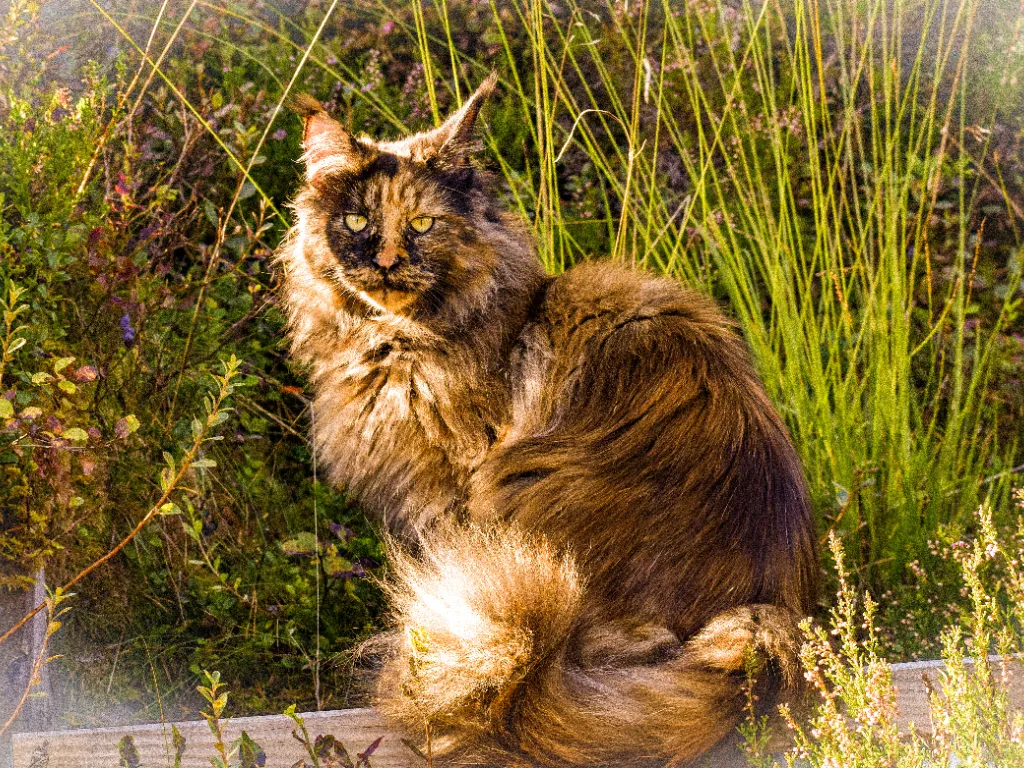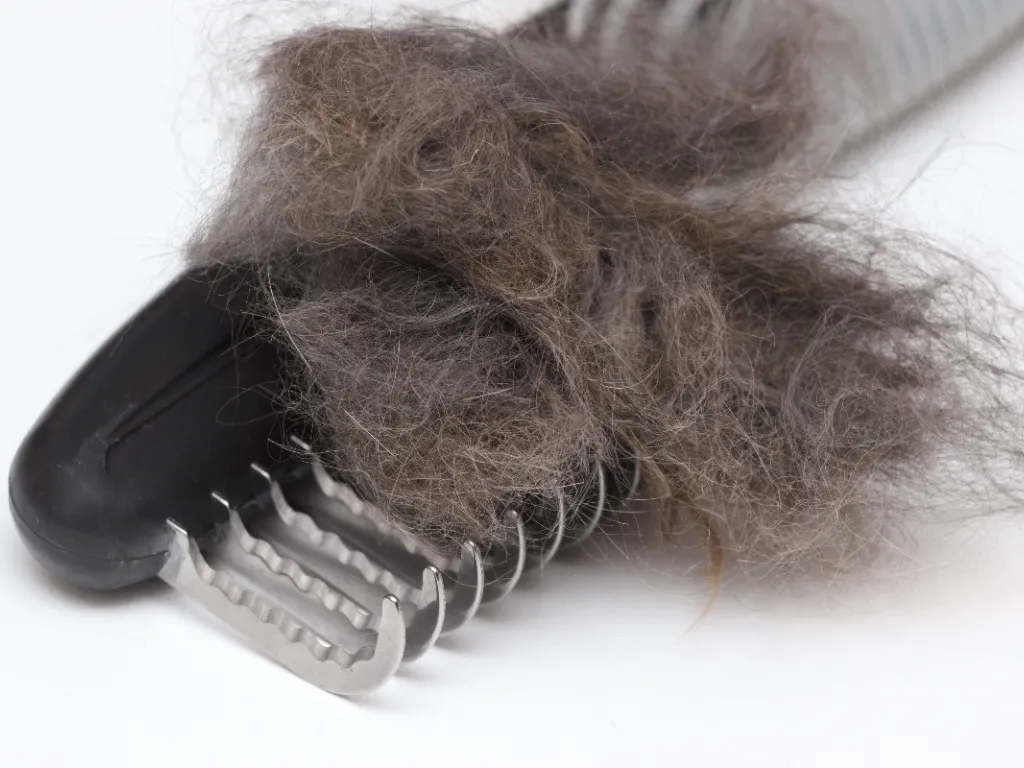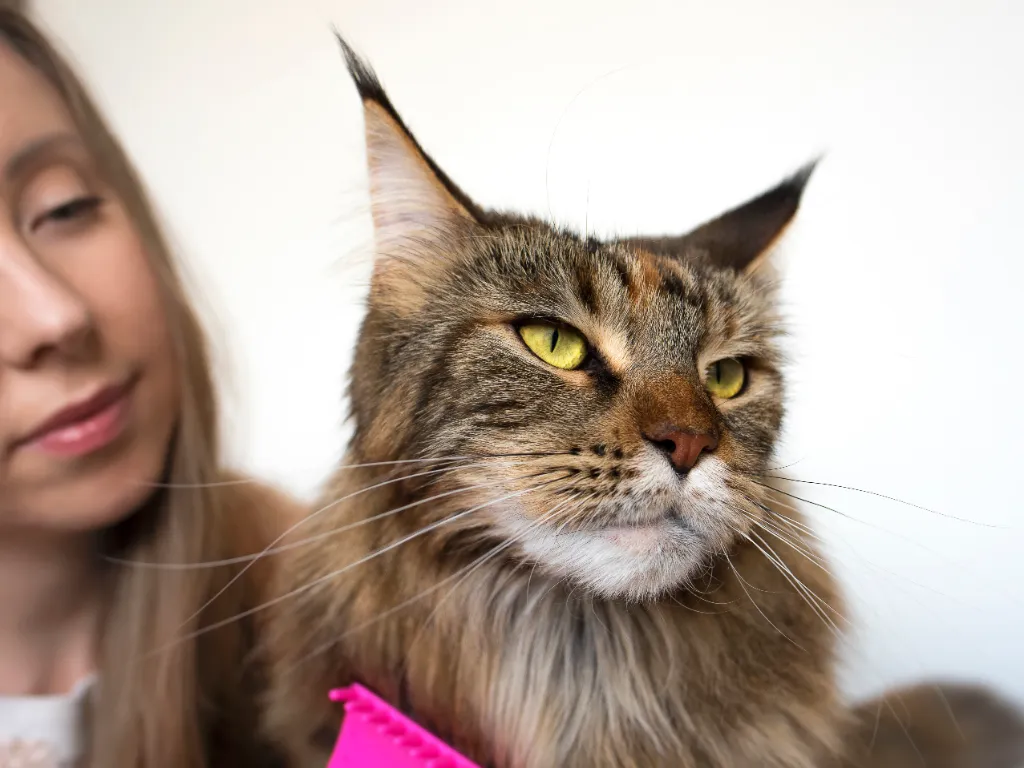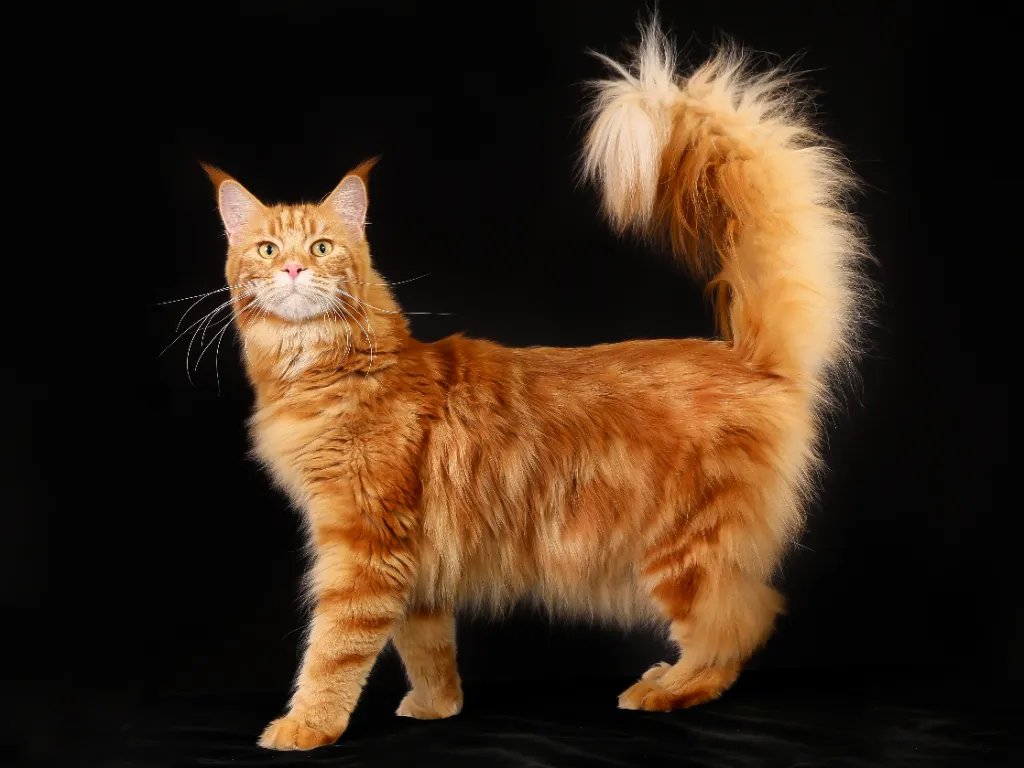Caring for a Maine Coon cat involves a unique set of grooming practices due to their long, luscious coat. Sometimes it just becomes too much for their owners though, leaving them to wonder: Is it okay to shave a Maine Coon Cat?
In general, it is safe to shave a Maine Coon cat, though the decision should not be made lightly. You must consider factors such as size of the cat, its age, health status, the condition of the coat and the reason why you want to shave it. Some situations require shaving for the health of the cat, such as cats with severely matted fur or a medical skin condition.
This article examines the importance of these grooming practices, particularly addressing the contentious issue of whether or not to shave a Maine Coon’s coat. We will explore the function of the Maine Coon’s coat, the potential implications of shaving, and the instances when shaving might be necessary for health reasons.
Read on to learn more about how Maine Coon owners can make the most informed decisions about their pet’s grooming needs.
Is It Okay To Shave A Maine Coon Cat? What You Need to Know
Understanding the Maine Coon Cat’s Coat
The Maine Coon cat is known for its beautiful and unique coat, which has evolved to adapt to different environments and weather conditions.
The most common coat type for Maine Coon cats is a long and thick one. This includes a full ruff or lion’s mane around the neck, bushy tail, and tufts of fur on the ears and feet. Their coats have other unique features as well.
Long and Water-Resistant Fur
The Maine Coon’s coat is characterized by its impressive length and texture. The fur is composed of long, flowing guard hairs and a soft, insulating undercoat. This double-layered is not only beautiful but also serves practical purposes.
The outer guard hairs are designed to repel water, giving the cat a level of water resistance that can be especially useful in damp environments. This natural feature harks back to the breed’s origins as skilled mousers on ships, where they would have been exposed to the elements of sea spray.
Dense Undercoat
Beneath the visible outer layer of guard hairs, the Maine Coon boasts a dense undercoat that provides an extra layer of insulation and protection.
This undercoat is particularly prominent in the colder months, allowing the cat to maintain warmth even in frigid temperatures. The longer guard hairs provide additional coverage and offer protection against wind and moisture.
Insulation and Temperature Regulation
One of the most remarkable aspects of the Maine Coon’s coat is its exceptional insulation properties. The combination of the dense undercoat and longer guard hairs works as a natural barrier against temperature fluctuations.
In cold climates, the long hair helps trap warm air close to the body, keeping the cat comfortable. During warmer seasons, the same coat aids in maintaining a cooler body temperature by allowing air to circulate through the guard hairs and dissipate excess heat.
Sun Protection and UV Radiation
The Maine Coon’s unique coat also offers some level of sun protection. The combination of the guard hairs and undercoat acts as a barrier against the sun’s ultraviolet (UV) rays, helping to prevent sunburn and potential skin damage.
This adaptation is particularly important for cats that spend time outdoors, as prolonged sun exposure can lead to various skin issues.
[Tip: To learn more about the Maine Coon cat, check out our breed information and care guide by clicking here]

Why Would You Want To Shave a Maine Coon Cat?
Debates among cat owners, veterinarians, and enthusiasts surround the topic of shaving a Maine Coon cat. While the breed’s natural coat has many advantages, there are situations where shaving may be considered to address specific concerns.
Overheating in Hot Climates
The Maine Coon cats’ thick, double-layered coat that them well in colder environments. However, in extremely hot weather, the dense fur can potentially lead to overheating.
Cats, in general, do not sweat like humans, and their primary means of cooling down is through grooming.
In situations where the heat is excessive and the cat struggles to regulate its body temperature, shaving the coat might be considered as a way to offer relief and prevent heat-related stress.
Managing Matting and Tangles
The Maine Coon’s luxurious coat, while magnificent, can be challenging to maintain. Due to the combination of long guard hairs and a dense undercoat, the fur is prone to matting and tangling.
Matting occurs when shed fur becomes entangled, forming knots close to the skin. This not only causes discomfort for the cat but can also lead to more serious skin problems if left untreated. Grooming a Maine Coon’s coat requires dedication, time, and specialized tools to prevent matting and maintain the coat’s health.
Grooming Challenges
Grooming a Maine Coon’s coat requires patience and expertise. The dense fur can easily tangle, especially in hard-to-reach areas like the belly, armpits, and tail.
Grooming sessions can be time-consuming and stressful for both the cat and the owner. Cats may develop aversions to grooming due to discomfort, which can worsen the issue over time.
As a result, the cat ends up with mats and tangles that may get so bad the only solution is to shave them.
Preventing Painful Matting and Skin Issues
Shaving a Maine Coon cat can prevent painful matting and skin problems. When mats are left untreated, they can pull at the skin, leading to irritation, inflammation, and potential infection.
Shaving the coat can provide a fresh start and eliminate existing matting, allowing the skin to breathe and heal. Additionally, shaved skin is easier to monitor for any signs of discomfort, irritation, or dermatological issues.
Arguments Against Shaving a Maine Coon Cat
Although shaving a Maine Coon cat may be necessary in certain situations, is generally not recommended due to important reasons related to the cat’s well-being.
Disruption of Natural Temperature Regulation
The Maine Coon’s coat is naturally designed to help regulate its body temperature. This means that the coat is important in both hot and cold weather.
The coat helps keep the cat cool in summer by allowing air circulation and warmth in winter by trapping heat close to the body. Shaving disrupts this natural process, making it more difficult for the cat to stay comfortable.
Risk of Sunburn and Skin Damage
The Maine Coon’s thick coat provides a layer of protection against the sun’s harmful rays. Shaving your cat’s fur removes this shield, leaving the cat’s skin exposed and vulnerable to sunburn and other forms of skin damage.
The skin of cats is sensitive, and unprotected exposure can lead to discomfort and potential health issues.
Increased Susceptibility to Skin Problems
When the coat is removed, the cat’s skin is directly exposed to irritants, allergens, and environmental factors it wasn’t meant to deal with. This can lead to skin problems like rashes, skin irritation, and allergies. An outdoor cat in particular will be more susceptible to insect bites.
The absence of the natural coat also disrupts the cat’s grooming routine, which can further contribute to skin problems and discomfort.
Psychological Effects on the Cat
Cats are creatures that value routine and comfort. Shaving a Maine Coon’s coat changes their appearance drastically, potentially causing stress and anxiety.
Just like people, cats have a sense of self-image and confidence, and altering their appearance can disrupt their sense of security. The cat may feel exposed, leading to behavioral changes and a decrease in overall well-being.
Alternatives to Shaving
Shaving a Maine Coon cat’s coat raises some concerns and it may not be the best way to manage your cat’s long coat. There are alternative approaches that prioritize the cat’s well-being and coat health. These alternatives consider the cat’s natural adaptations and specific grooming needs.

Brushing and Detangling as Preventive Measures
Regular brushing is a key component of maintaining a Maine Coon’s luxurious coat. Using the right tools like a slicker brush and detangling comb can help prevent matting and tangling by removing loose hair and preventing it from becoming entangled.
This not only keeps the coat looking its best but also reduces the risk of discomfort for the cat. Brushing also offers valuable bonding time between the cat and its owner.
Maintaining a regular grooming routine is critical with Maine Coon cats. This involves brushing them regularly, checking for tangles or mats, and promptly addressing any issues that arise.
Seek Professional Help
If cat owners are facing challenges with the grooming process, seeking advice from professional groomers or veterinarians can be very helpful. These experts can provide valuable insights and tips on how to maintain the cat’s coat, ensuring both its health and appearance are well taken care of.
Or, you can just schedule with a professional groomer on a regular basis to keep things in check.
Controlled Trimming to Manage Coat Length
Rather than opting for full shaving, a good idea is to use controlled trimming to manage a Maine Coon’s long fur. Trimming can be particularly useful around sensitive areas of the cat’s body that are prone to matting, such as the belly, armpits, and tail.
Matting can be minimized by carefully and strategically trimming these areas while allowing the majority of the coat to remain intact. This approach maintains the coat’s natural functions while addressing specific grooming challenges.
Preserving the Integrity of the Coat: Strategies to Prevent Matting
Seasonal trimming can be done which strikes a balance between maintaining the coat’s natural benefits and preventing matting. The goal is to enhance the cat’s comfort and appearance without compromising the coat’s insulation and protective properties.
A professional groomer with experience in working with long-haired breeds can provide advice on appropriate trimming techniques that suit the Maine Coon’s unique coat structure.
When Is Shaving A Cat Necessary?
Shaving a Maine Coon cat should generally be avoided due to the potential negative effects on its natural coat and well-being. However, there are certain medical situations where shaving cannot be avoided.
Maine Coon cats will like need to be shaved in the following situations:
- Severe Matting or Fur Impaction: If a Maine Coon’s coat becomes severely matted or tangled to the point where it causes pain, discomfort, or restricts movement, shaving may be considered as a last resort. Mats close to the skin can pull and tug on the skin, leading to pain, inflammation, and even skin damage. In such cases, shaving can provide immediate relief and allow the skin to heal.
- Skin Infections or Dermatological Issues: In situations where a Maine Coon cat develops severe skin infections, allergies, or dermatological conditions, shaving might be necessary to allow for effective treatment. Shaving can facilitate better access to affected areas, making it easier to apply medications and treatments directly to the skin.
- Surgical Procedure or Medical Reason: Some medical procedures or examinations may require a Maine Coon’s coat to be shaved in specific areas. This can allow veterinarians to perform surgeries or diagnostic tests more effectively. Shaving in such instances is a temporary measure to ensure proper medical care.
- Recovery from Surgery or Medical Treatment: After surgery or medical treatments that require close monitoring of the cat’s condition, shaving may be advised. This allows for better observation of incisions, wounds, or reactions to medications
- Severe Parasitic Infestations: If a Maine Coon becomes infested with external parasites like ticks or fleas, and the infestation is severe and resistant to other treatments, shaving might be considered to eliminate the parasites and prevent their recurrence. Shaving allows for closer inspection and targeted treatment application.
- Overweight Cats with Hygiene Issues: Maine Coon cats that are severely overweight may face challenges in maintaining proper grooming due to their size. This can result in hygiene concerns, especially around the hindquarters. It may be necessary to trim specific areas or even consider shaving the entire cat to enhance hygiene and mitigate the risk of skin infections.
Summing Up the Pros And Cons
While shaving your Maine Coon’s fur may seem like a quick solution, it’s important to consider the broader impact on the Maine Coon cat’s health and happiness. The coat is not just for looks; it plays a crucial role in the cat’s comfort, protection, and psychological well-being.
Their coat serves as protection, and removing it can expose them to sunburn and other hazards. Shaving may cause stress or anxiety for cats due to the sensation of shaved skin.
Instead of shaving, it is better to explore alternatives that maintain the coat’s integrity and natural functions. Consulting professionals like veterinarians or experienced groomers can help make informed decisions that prioritize the cat’s overall quality of life.
Factors such as the cat’s health, temperament, and living environment should be carefully considered before resorting to such a drastic measure. In some cases, alternative grooming methods like regular brushing, controlled trimming, and using specialized detangling tools can effectively address concerns without the need for full shaving.
Ultimately, the decision to shave a Maine Coon cat should be made in consultation with a veterinarian or experienced groomer.

Conclusion
The care and grooming of a Maine Coon’s coat requires a thoughtful and well-informed approach. Their magnificent coats serve a purpose beyond aesthetics; it plays a crucial role in the overall health and well-being of your feline friend.
Therefore, the main focus should be on preserving the coat’s natural state whenever possible, and shaving should only be considered when absolutely necessary.
Seeking advice from professional groomers or veterinarians, who possess expertise in grooming, can assist cat owners in navigating potential challenges.
Keep in mind that your Maine Coon’s beautiful coat serves a functional purpose. Still, with proper care, its luxurious coat can be maintained beautifully.
Want to learn more about how to groom long-haired cats? Check out our guide to cat grooming by clicking here!
Sources:

